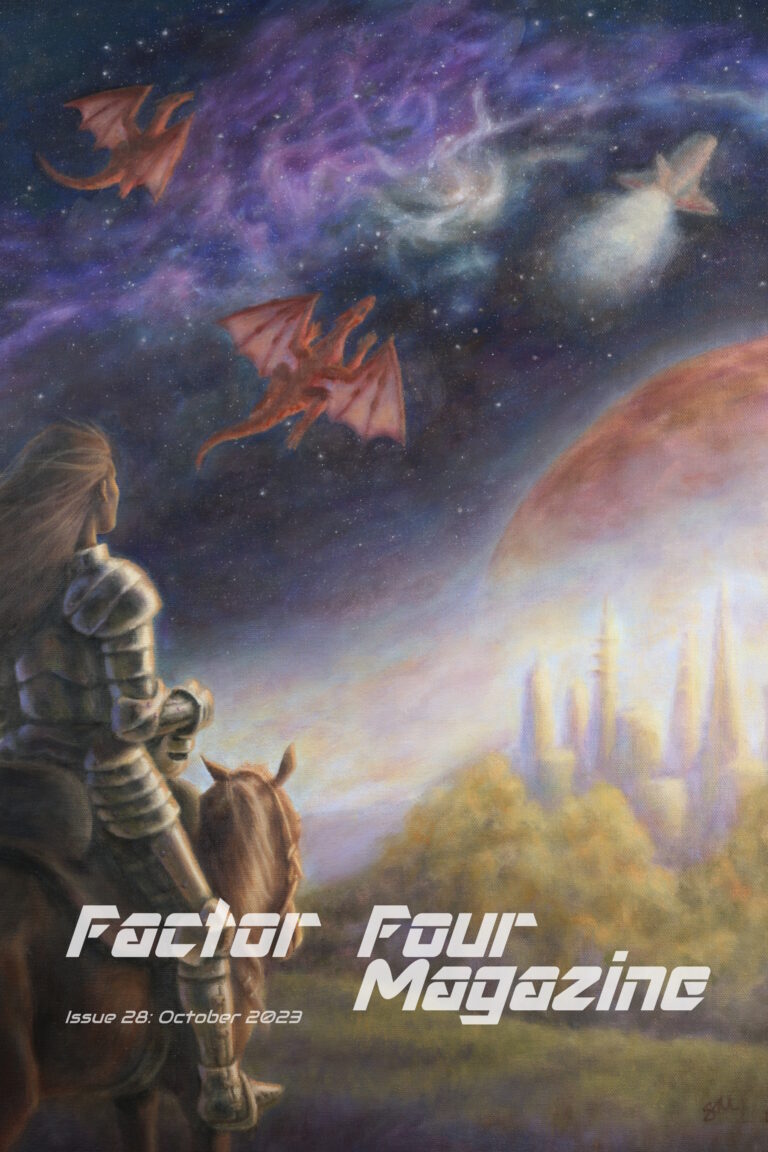In Fates Arms by R. E. Rule

Perdita was at the Third Street bus stop when she realized she was invisible. The bus had come lumbering and puffing to the curb, and she’d started to climb on when a man shoved past her, driving an elbow into her back. He didn’t turn, didn’t apologize, just scrambled for standing room by the window. People crowded onto the bus, pushing Perdita into the back corner, and suddenly it made sense: the barista who didn’t take her order, the unnoticed hand she’d raised during the work meeting, the text on her phone marked ‘read’ with no response.
No one looked at her or made room for her or apologized for stepping on her feet. Only one old woman sitting by the window and knitting with straight black needles glanced up and smiled. Relieved enough to forget she didn’t like talking to strangers, Perdita asked, “What’re you making?”
The old woman laughed. “You wouldn’t believe me.” Her hair was unnaturally black, inky and untouched by gray, but her face was as wrinkled as tree bark.
The bus stopped. A woman on her cell phone came to hold the same pole as Perdita, shoving her away so she had to stand with legs spread wide against the push and pull of the moving bus.
“I think I’m invisible,” Perdita said loudly, hoping for a glare from the woman on the phone and getting none.
“Yes.” The old woman squinted at her. “I noticed that. But strange things have been happening lately. Things I’ve never seen before. And you wouldn’t believe me if I told you how old I was.”
Perdita politely tried to smile and found herself staring at the old woman’s hands. They perpetually danced, shifting the needles, looping the yarn that pulled with a slow tug tug tug from the black bag at her feet. Her eyes might watch the bus and the people and the window, but her hands never stopped. Perdita had the strangest feeling that if they ever did, the rest of the world would stop too.
“I might be able to help you,” she realized the old woman was saying. “You can find me in Fates Arms. Top floor.”
Then the bus stopped at Eleventh Street where Perdita got off. She hadn’t planned to go—crazy old lady might murder her with those knitting needles—but then she’d gone home to find her landlord showing her apartment to new tenants. “Fully furnished,” he boasted.
Furnished with HER couch, and HER table, and HER unmade bed. The landlord didn’t hear her protests. So Perdita left, and walked, and eventually found herself outside the Fates Arms.
It was a pseudo-Victorian mess of red brick, and tangled ivy, and broken windows that hung open like gaping mouths. Inside, it smelled of mildew and dust; the stairs creaked uneasily under her feet as she climbed. On the top floor, she found a single black door and knocked.
“Come in,” the old woman’s voice called.
It was too dark to see the room, but it was warm and smelled richly of spices, like Chai and gingerbread cookies and underneath a sharpness that made Perdita think if she threw open the shuttered windows, she would find the sea. From the far corner came the click click click of dancing knitting needles.
“Hello?” Perdita hovered uneasily in the doorway.
“Come in,” the old woman said again. “Shut the door.”
Perdita came in but she left the door open. “How can you see me?” she asked. “When no one else can?”
“That may take a while to explain. Perhaps you’d better sit.”
Perdita took another step into the room. Her eyes were adjusting, and a faint light shone through the open door. Yarn of every color and pattern covered the floor and furniture, slowly pulling and writhing like delicate snakes. At first, Perdita thought a strange shadow was refracted against the far wall; many dark arms were moving and shifting. Then a great black bulk lurched forward, and a spider with the old woman’s dark eyes peered down at Perdita.
Perdita licked her dry lips. “You said I wouldn’t believe you if you told me what you were knitting. I think I will now.”
“This one’s a lawyer,” the spider-woman said, waggling a green lump of yarn. “And a fine mess too. This one’s just been born. Barely begun.” From the walls hung more bundles of yarn: some tangled, some knotted, some beautifully intricate, some mere scraps. All different shades and hues, no two alike. “Sometimes they barely give us anything to work with,” she said sadly. “But we do our best until the yarn runs out.”
“Is that what happened to me?” Perdita asked fearfully.
“No. You’re still full. Still with plenty left.” The spider-woman frowned. “That’s what I can’t understand. I don’t know whose work you are, but I’m sure they wouldn’t just leave you like this.”
She put a hand that was somehow also a sharp black needle against Perdita’s chest and pushed. Perdita gasped, expecting pain; instead she was filled with a sense of vastness, of loneliness and aching hope. When the needle came out again, it held a pale blue thread with a frayed end. The other three sets of hand-needles had never stopped knitting. “Yarn broke,” the spider-woman said simply, examining it. “Now I have seen everything.”
Perdita gingerly took the thread. Tugging, she felt a pull deep inside her. “What am I supposed to do?”
“Couldn’t say.”
“But I don’t want to be invisible!” Perdita cried. “Left alone, sure. But that’s different than never being seen, than being stepped on. Couldn’t you…?”
“My hands are full,” the spider said. She shrugged her many shoulders, her hands still working.
“That’s it then,” Perdita said hopelessly.
The spider-woman was silent a moment. Then came a sound like splintering wood, and she pushed two ebony knitting needles into Perdita’s hands. “You’d better sit down. There’ll be a lot to learn.”






